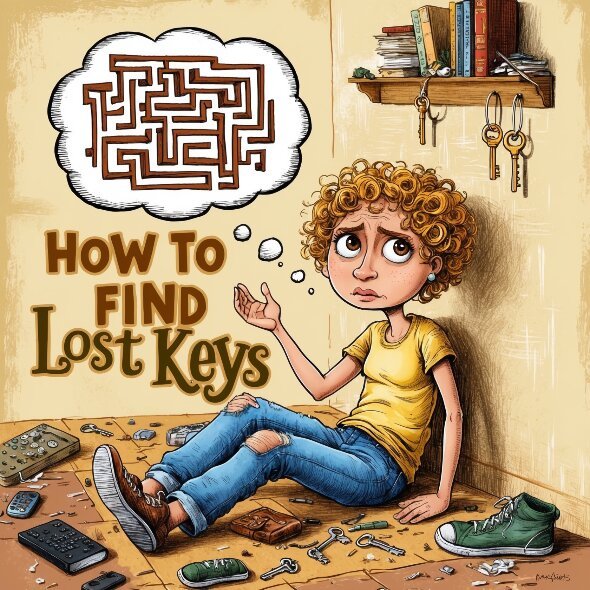How to Find Lost Keys – A Detailed Guide
Losing your keys can be a stressful experience, but with a methodical approach, you can often locate them more quickly. Follow these steps to increase your chances of finding your lost keys.

Stay Calm and Retrace Your Steps
The first thing to do when you realize your keys are missing is to stay calm. Panic can cloud your thinking and make it harder to remember where you last had them.
Think about the last time you remember using your keys. Where were you and what were you doing? For example, did you unlock the front door, drive somewhere, or lock a drawer?
Go back to that spot, if possible, and retrace your steps from there. Walk through the places you’ve been and try to visualize yourself holding or using the keys. This can help jog your memory.
Check the Most Common Spots
Pockets: It’s easy to forget that your keys are still in your pocket, especially if you’re rushing or distracted. Check all your clothing, including jackets, pants, and any bags you may have carried.
Key Hooks or Trays: Do you usually put your keys in a specific spot when you come home, like a key hook or tray? Even if you don’t remember doing it, check these areas since muscle memory might have kicked in.
Surfaces: Look around areas where you typically set down things when you enter a room, such as kitchen counters, dining tables, desks, or bedside tables.
Coat or Shoe Areas: Sometimes, we set things down when taking off coats or shoes. Check coat racks, by the door, or where you keep your shoes.
Don’t Recheck the Same Places
Once you’ve checked a place thoroughly, avoid rechecking it immediately. It’s tempting to return to the same spots multiple times, but this can waste time and increase frustration. Focus on new areas to broaden your search.
If after searching other areas you still haven’t found the keys, you can return later with fresh eyes. Sometimes a short break can help you see things you missed the first time.
Search in Unlikely Places
Furniture: Keys often slip into places we don’t expect. Look between sofa cushions, inside chairs, and in the crevices of your furniture.
Under Furniture: If your keys were dropped, they may have rolled or slid under furniture. Check under couches, tables, beds, and other larger items in the area.
Bathroom or Bedroom: Sometimes we carry our keys absentmindedly into places like the bathroom or bedroom. Look on countertops, nightstands, or near the sink.

Use a Flashlight for Dark Areas
A flashlight can be incredibly helpful for finding keys, especially in darker or cluttered areas. Shine the light under furniture, inside bags, or anywhere that might have shadows. The light can catch the reflection of the metal on your keys, making them easier to spot.
Listen for Key Sounds
If your keys are attached to a chain or make noise when they move, you can use this to your advantage. Walk around in silence, lightly shaking or moving items, and listen for the sound of the keys clinking against something. This is especially useful if you’ve dropped them somewhere cluttered or if they’re buried in a pile of clothes or cushions.
Think About Recent Activities
Did you just come back from running errands, or were you working on a project? Think about the areas where you were most active. If you were cooking, check the kitchen. If you were cleaning, look in laundry baskets or on shelves you were dusting.
Keys can also end up in the fridge or pantry if you were carrying them while putting groceries away or making food.
Ask Others
Sometimes, asking someone else can make all the difference. If anyone was with you when you last had the keys, ask them if they remember seeing where you put them. They might recall a small detail you’ve overlooked or suggest a place you haven’t thought to check.
Even if you were alone when you lost the keys, someone else in the house might have seen them or unknowingly moved them.
Use a Key Finder or Tracking Device
If you’ve attached a tracking device to your keys, like a Apple AirTag, you can use the associated app on your phone to locate them. Most of these devices have a map feature to show the last known location of your keys and can play a sound to help you find them when nearby.
Check Your Car
If you’ve recently driven or spent time in your car, thoroughly check the vehicle. Look around the driver’s seat, between the seats, under the seat, and in places like the glove compartment or center console. Keys can easily slip into small spaces in the car and be overlooked.

Take a Break and Reassess
If you’ve been searching for a long time and frustration is building, it may be helpful to take a short break. Sometimes, stepping away for a few minutes can help clear your mind and make the search more effective when you return.
After your break, recheck the places you’ve already searched. Keys are sometimes overlooked, especially in obvious spots, so a fresh perspective can help.
What features should I look for in a travel backpack?
To prevent future stress from lost keys, consider setting up systems that make it harder to lose them. Here are a few ideas:
Frequently Asked Questions (FAQ)
What should I do first when I realize my keys are lost?
Start by retracing your steps. Think back to where you last had your keys and what you were doing at the time.
How can I retrace my steps effectively?
Mentally walk through your day from the last moment you remember having the keys. Ask yourself if you set them down during any specific activity or if you were carrying something else that might have distracted you.
How can I prevent losing my keys in the future?
Use a key holder or designated spot by the door to always place your keys. Attach a keychain with a tracker, like AirTag.
Should I change my locks if my keys are permanently lost?
If you suspect your keys were stolen or lost in a public place, it may be wise to change your locks for security reasons.
